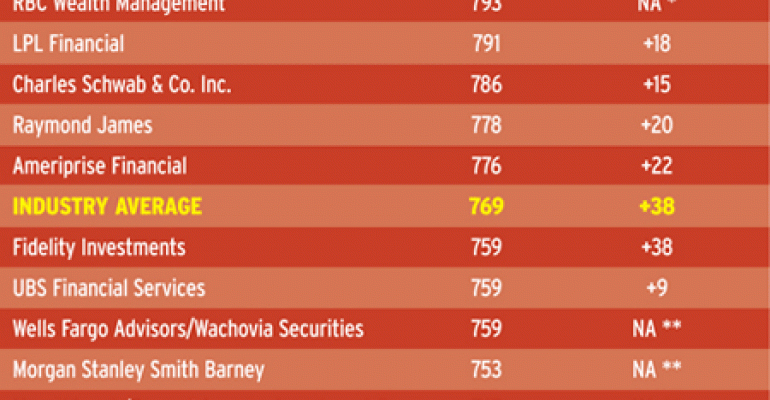Edward Jones topped annual investor satisfaction rankings compiled by J.D. Power and Associates for the second consecutive year, with RBC Wealth Management a close second, according to the study released yesterday. (See how they rated.) Overall investor satisfaction with the dozen companies in the study was markedly higher this year, although the survey also showed that investors increasingly believe that investment firms are more focused on profits than on customer satisfaction.
“The surprising thing for this year’s study is the markets improved and we saw improvement in (investor) satisfaction, but what didn’t improve is investor perception of their firms,” says David Lo, director of investor services practices at J. D. Power. That perception has been trending lower over several years, he adds. “In this industry, a lot of the sentiment is driven mostly by the FA. If the sentiment toward the advisor is good, the relationship is good, but the perception of the firm might be different.” That could be driven by a number of factors, such as complaints about fees or negative news about financial companies in the media, he says.
The study polled about 4,500 investors between May 3-14. Overall investor satisfaction averaged 769 on a 1,000-point scale, up from 731 a year ago. The survey measured satisfaction according to seven factors (in descending order of importance:) investment advisor; investment performance; account information; account offerings; commissions and fees; website; and problem resolution.

The relationship with the advisor is essential to improving customer satisfaction, the report says. It links satisfaction with asset growth; firms see an average increase in assets under management of $125,000 among highly satisfied investors, compared with a loss of $6,000 among investors with low levels of satisfaction. Advisor practices that boost satisfaction include:
*Fostering engaged relationships that involve developing an investment strategy;
*Periodically reviewing investment objectives;
*Regular communication regarding investment performance;
*Clear explanations for fees and commissions.
The ranking of RBC Wealth Management at number two in the survey was a sharp change from last year, when J.D. Power was unable to compile enough RBC investor replies to set a meaningful place for the firm among its peers.
John Taft, chief executive of RBC U.S. Wealth Management, said the company’s growth over the past three years—800 more financial consultants, for a total of 2,200; currently $166.4 billion in assets under administration—contributed to stronger response this year. The company’s efforts to help advisors develop closer relationships with clients has boosted performance, he adds. “We have a small firm culture and big firm resources, and I think that allows us to attract some of the best financial consultants in the country,” he says.





